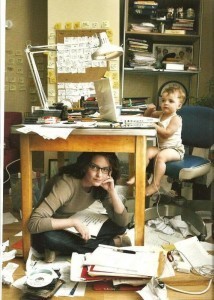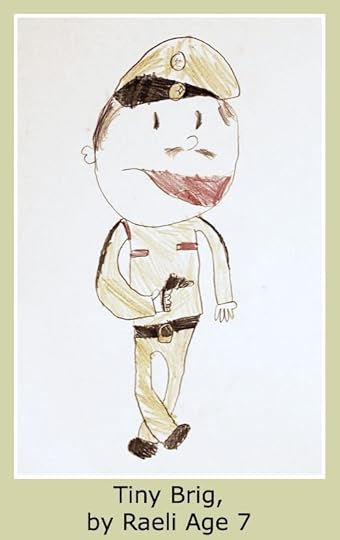Tansy Rayner Roberts's Blog, page 91
January 5, 2013
Facebook and the Tasmanian Fires
So, many of you (especially those in Australia with access to the news reports) will probably know about the devastating bushfires that have swept through Tasmania over the last couple of days. I’ve had quite a few queries so wanted to stick my hand up and say yes, our family is okay, not anywhere near the various danger zones. We have friends who had close calls, though, and others whose loved ones have indeed lost their houses.
It’s probably not a surprise that social media has been pretty damned useful over the last few days. I’m used to following disaster information on Twitter but haven’t been actively on Facebook before when something like this happened, and it was really great to be able to click for recent updates on friends/acquaintances that I knew lived in areas close to the worst of the fires. I saw families and friends checking in with each other regularly, and also sharing personal observations of what was going on and when.
I’m not actually “Twitter friends” with that many Tasmanians, as it turned out, but a LOT of people I rarely interact with online are right there on Facebook when I want to find them!
On Friday (our horrendous 41+ degree day), even before the full extent of the disaster was known, a Hobart woman called Melanie Irons set up a Facebook page called Tassie Fires – We Can Help, which enabled people to co-ordinate many small scale rescue efforts, posting if they had available resources such as an extra pair of hands, a paddock with room for horses, housing for other evacuated pets, and also posting when something specific was needed. The site was used to track down missing persons, to check in, and to share information. It was pretty awesome.
Donations flooded into the Sorell hall where evacuees were staying temporarily, but it soon reached the point where there was too much stuff to store, and not necessarily the right stuff – second hand clothes were far less useful than new, for instance, while toiletries and particularly baby supplies such as formula and nappies were desperately needed. Again, social media was available to get the word out, so that people wanting to help could try to do so in a way that was actually helpful rather than merely making themselves feel better (hint: money is usually the most useful thing).
The Red Cross has set up a Bushfire appeal with donations going directly to the relief effort as well as the needs of evacuees.
St Vincent De Paul Tasmania is managing the organisation of donated items now for the evacuees from the Tasman Peninsula (the Dunalley and Forcett fires etc.), with a temporary warehouse at the Glenorchy showgrounds receiving items:
Vinnies Southern Regional office will be open today from 10 am until 3 pm (62 344 244) to answer any enquiries regarding donations. Your assistance is greatly needed. If you can help by donating blankets/bedding, toilet packs, essential new clothing, children’s or babies clothing or much needed monetary donations please call the above number or 6333 0822 during business hours or 0408 555 382 after hours or visit www.vinnies.org.au
I definitely recommend calling if you have something to donate which doesn’t fit the exact requests currently – we have a cot and baby bedding for instance that we wanted to make available, but a phone call let me know that they are not asking for big items like that for another week, once housing has been organised for evacuees.
The Salvation Army response to current Bushfires in Tasmania
1800 727077 Red Cross Number and the Red Cross Website for money donations – http://www.redcross.org.au/
A national phone number has been established to register details of people directly or indirectly affected by the Tasmanian bushfires. The number is 1800� 727� 077. Relatives should be able to use this number to register concerns about those they have not managed to get into contact with.
Some useful Twitter accounts I found include:
@TasFireService
@TassieNews
@theexaminerrss
The Hobart Mercury Twitter account, disappointingly, has not updated since Thursday (SERIOUSLY, nothing worth tweeting on Friday? Nothing at all??).
Last time a serious fire made it near where I lived was a decade or more ago, and I remember how scary it was, figuring out the scale of what was happening, whether we needed to evacuate (the far side of our back fence got a bit charred) and who in our street needed help. Mobile phones felt like a lifesaver then, but I have to say, social media has our backs in a crisis. I was really touched and surprised to discover that Facebook is great way for those of us feeling helpless in the face of this kind of disaster to figure out how to make a useful contribution.
It’s still a bit evil MOST of the time, of course…
Award-winning Australian Women (SF, Horror and Fantasy Books) 2012
I can’t believe it’s more than a year since I wrote this post as a resource for the Australian Women Writers Challenge – award-winning books by Australian Women writers, editors etc. for people looking to diversify their reading. Awards are only one way to find a great book, but you know that at least a few people have considered them the best of the year, which is a good start!
The list is a bit clunky and not nearly as comprehensive as I originally planned it to be – it was written in a haze of wild-eyed internet searches. I will update the list with 2012 winners shortly.
So what happened award-wise for Australian women writers of speculative fiction in 2012? It’s certainly looking pretty healthy right now!
AUREALIS AWARDS
Of twelve fiction awards presented (best horror novel was not given out), there were fifteen writers/editors honoured, of which nine were women.
City of Lies by Lian Tanner (Allen & Unwin) – BEST CHILDREN’S FICTION (told primarily through words):
Only Ever Always by Penni Russon (Allen & Unwin) – BEST YOUNG ADULT NOVEL
Hidden by Mirranda Burton (author and illustrator) (Black Pepper) – BEST GRAPHIC NOVEL
Bluegrass Symphony by Lisa L. Hannett (Ticonderoga Publications) – BEST COLLECTION
Ember and Ash by Pamela Freeman (Hachette) – BEST FANTASY NOVEL
The Courier’s New Bicycle by Kim Westwood (HarperCollins) – BEST SCIENCE FICTION NOVEL
DITMARS
Four fiction awards were presented, with a 50-50 gender balance.
The Courier’s New Bicycle, Kim Westwood (HarperCollins) – BEST NOVEL
NORMA K HEMMING AWARD (Marks excellence in the exploration of themes of race, gender, sexuality, class and disability)
Anita Bell writing as A.A. Bell for her novel Hindsight
Sara Warneke writing as Sara Douglass for her novel The Diamond Diadem
TIN DUCKS: (West Australian Fan Awards)
Nightsiders by Sue Isle won both Best WA Professional Long Written Work and Best WA Professional Production.
BRITISH FANTASY AWARDS
This is a short fiction one so I wouldn’t normally include it (otherwise my list is going to be insanely long – I never did manage to put the short fiction version together) but worth announcing because in 2012 Angela Slatter became the first Australian EVER to win one of these!
Short Fiction Winner: The Coffin-Maker’s Daughter; Angela Slatter (A Book of Horrors, Jo Fletcher Books)
So, before I update the resource list of award-winning Australian SF & Fantasy books by women writers, what have I missed? Any other awards out there from 2012?
Domesticating the Doctor II: The Missus, the Ex and the Mothers-in-Law
Originally posted on Doctor Her on 15 March 2012.
 In the last Domesticating the Doctor post I talked about various instances from Classic and Big Finish Doctor Who of the Doctor being domesticated against his nature. Now it’s time for the New Who story! Or the RTD years, at least, as it got a bit longer than I expected.
In the last Domesticating the Doctor post I talked about various instances from Classic and Big Finish Doctor Who of the Doctor being domesticated against his nature. Now it’s time for the New Who story! Or the RTD years, at least, as it got a bit longer than I expected.
The Ninth Doctor puts his cards on the table right from the start. “I don’t do domestic.” No previous Doctor had ever had to make such a statement, but right from the start, the writing team of New Who seemed to relish throwing kitchen appliances and chips and the telly at the Doctor’s head, to watch him squirm.
“I’ve never been slapped by someone’s Mum before,” he complains in Aliens of London, one of the stories that most deeply explores the collision of the Doctor and domesticity. He’s never had to deal with anyone’s Mum before – he’s met a few companions’ Dads, but they’ve mostly got themselves conveniently killed before the credits rolled.
Imagine, oh imagine, if Jo Grant’s Mum had turned up to see what her new boss was like? Or if Romana’s Mum had arrived in the TARDIS to demand the Fourth Doctor tell her why her daughter’s postcards home had suddenly stopped…
Jackie Tyler, even more than Rose, drags the Doctor kicking and screaming into a world where you watch the alien invasion on the telly, and the TARDIS needs to start considering a regular parking space in London. He allows Rose phone access to him, something we’ve never seen him do before – and even occasionally, as in Father’s Day, marvels at the “ordinary people” life that he is completely not a part of.
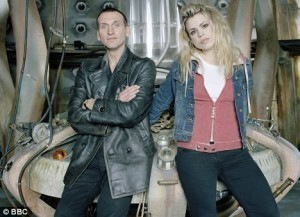 For the most part he stays that way, largely because Rose is so desperate to escape her life on the housing estate that she doesn’t push him to embrace her home life (except for occasional day trips to catch up with her Mum and get her laundry done). This is a Doctor who breaks the rules and thumbs his nose at any kind of domestic restraint: quite literally, in Bad Wolf, when he is trapped in the Big Brother house, he escapes using rudeness and an inability to follow social conventions.
For the most part he stays that way, largely because Rose is so desperate to escape her life on the housing estate that she doesn’t push him to embrace her home life (except for occasional day trips to catch up with her Mum and get her laundry done). This is a Doctor who breaks the rules and thumbs his nose at any kind of domestic restraint: quite literally, in Bad Wolf, when he is trapped in the Big Brother house, he escapes using rudeness and an inability to follow social conventions.
Rose’s own journey is one of choosing the Doctor over a domestic everyday life: not just once in the first episode, but several times, as she regularly returns home and then leaves with him all over again. This is important because we have never seen companions do this before, except those of the Pertwee era where the Doctor himself had a home on Earth, and being a companion did not mean being tied to the TARDIS.
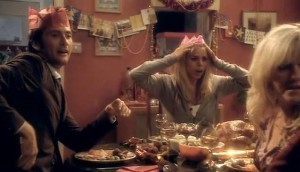 When the Doctor changes, his relationship to domesticity is one of the key personality shifts. The Tenth Doctor embraces Jackie and Mickey instead of snarking at them (well, he does that too, but he hugs them first) and he is perfectly willing to stay and eat Christmas dinner with Rose’s family rather than sulking in the TARDIS or insisting they leave right away.
When the Doctor changes, his relationship to domesticity is one of the key personality shifts. The Tenth Doctor embraces Jackie and Mickey instead of snarking at them (well, he does that too, but he hugs them first) and he is perfectly willing to stay and eat Christmas dinner with Rose’s family rather than sulking in the TARDIS or insisting they leave right away.
Indeed, the time lapse between The Christmas Invasion and New Earth suggests they have hung around the Powell Estate for several days or weeks – certainly long enough for the snow to melt and for Rose to have her hair done! She no longer has to choose between her family and her Doctor… though of course, she chooses travelling, every time.
Series 2 is the one where the Doctor and his companion are at their cosiest, and he is at his most sympathetic towards domesticity – he still doesn’t really understand how humans work (witness the licking of the jam in Fear Her) but he is actively interested in trying to do so. Also, like the Third and Seventh Doctor eras, this is a season with several stories that themselves portray the domestic world as a source for horror and fear: we see families torn apart by the technology they take for granted in The Age of Steel and Rise of the Cybermen; alien dinner ladies and school children turned into computers in School Reunion, ordinary people having their lives destroyed merely because they are fans of the Doctor in Love and Monsters, and alien invaders causing havoc in suburban streets in Fear Her and The Idiot’s Lantern.
All this, and Rose learns through the return of Sarah Jane that the Doctor doesn’t have a habit of keeping his companions in the TARDIS forever – he leaves them behind, and doesn’t look back. In the same story, we see her unsettled when the Doctor allows Mickey to join them – her domestic life and TARDIS life have suddenly got a bit too close together, and it’s clear that she’s not ready to have both spheres of her life collide together.
(I was disappointed they did so little with this, ridding the TARDIS of Mickey the story after next – there was so much story potential in this clash of Rose’s two worlds)
It’s the spacey two-parter The Impossible Planet/The Satan Pit that really brings home the limitations of the Doctor’s relationship to domesticity: when it looks like the TARDIS has been lost forever, Rose tries to plan for a life without her, in which she and the Doctor live in a house… and it’s clear from his reaction that the thought is utterly unimaginable. It’s the first time it sinks in to Rose that the Doctor’s travelling life, onwards and upwards forever, is not something that has a use by date.
Jackie also has concerns that her daughter’s relationship with the Doctor is turning her into something less than (or more than) human. While her own relationship with this Tenth Doctor has become that of a mother-in-law who accepts the new bloke into her family, warts and all, she also feels threatened by Rose’s alien experiences, and worries for her daughter’s future – understandable, considering Rose isn’t past 20 yet and doesn’t realise what ‘forever’ actually means!
Ultimately, the Doctor chooses that Rose will stay with her family and lose him forever; Rose, not liking that choice, chooses to never see her family again in order to stay with him forever, and almost dies; finally, Pete saves Rose which also means she stays with her family and loses the Doctor.
While this can definitely be read as the two men in her life making patriarchal decisions about what’s best for her, it’s hard for me as a parent to wish it had gone any other way. The thought of Jackie stuck in that other universe with her husband returned to her, a new baby and never seeing Rose again is every bit as devastating.
The Doctor’s own loss is conveyed not only through David Tennant man-paining at the cameras, but also by the fact that he never tries to embrace domesticity again. He takes far less interest in the families of his next two companions, Martha and Donna, with the exception of Wilf who becomes a friend in his own right rather than someone who comes with the Donna package.
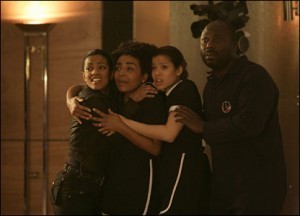 One of the big differences between Rose and Martha as companions is that Martha has nothing to run away from. Travelling with the Doctor is temporary, an adventure and an experiment. She’s not only settled in her career and flat and studies, but she is completely wrapped up in her family and their problems – indeed, getting a break from those problems can be read as one of the reasons she hops ship upon the TARDIS, though she wasn’t looking for more than a brief holiday from responsibility.
One of the big differences between Rose and Martha as companions is that Martha has nothing to run away from. Travelling with the Doctor is temporary, an adventure and an experiment. She’s not only settled in her career and flat and studies, but she is completely wrapped up in her family and their problems – indeed, getting a break from those problems can be read as one of the reasons she hops ship upon the TARDIS, though she wasn’t looking for more than a brief holiday from responsibility.
Francine, Martha’s mother, is also very different to Jackie: influenced by the Master and his cronies (though this isn’t obvious at first) she never embraces the Doctor as a necessary evil, but sees him as the enemy right from the start. She’s that other kind of stock character mother-in-law, the one that won’t even pretend to be nice to the strange man her daughter brings home. It’s Tish, Martha’s bubbly sister, who welcomes him into the family, assuming he is Martha’s new man.
It’s Martha, not Rose, who actually does experience a TARDIS-free domestic life with the Doctor, but this happens offscreen in Blink – all we really know about it is that she is the one working to support them.
When Martha leaves the Doctor, after a horrific year in which she thought of little but him and how important he was to humanity, in which she fought a war with words and lost part of herself, she makes the opposite choice that Rose did: she chooses the needs of her family over the Doctor. She’s not choosing to never see him again, but she is making it clear that her family’s general welfare is far more important to her than travelling in the TARDIS. It’s also fairly clear that the Doctor doesn’t entirely grasp why she needs to stay with them – it’s not life or death, it’s about those squishy human feelings, and he’s falling short.
And yes she does cite her romantic feelings for him as being another reason why she has to stay behind, but that is a secondary revelation, not the primary one. It also has the benefit of keeping him from making too much of a fuss about losing her.
Donna brings a wave of domesticity with her – she chats endlessly about the kind of social details and gossip that the Doctor has never had to deal with, because Rose never tried to make him care about her life or her friends. Donna is confident enough in herself that when she’s interested in something, she’ll just MAKE him listen to her.
At the same time, there’s little about Donna to challenge the Doctor’s disinterest in domestic issues, because like Rose, she wants something bigger. She’s an even more enthusiastic space tourist because for her, it’s far more about the adventure than it is about the Doctor specifically. As Courtney noted in her post about poverty and the companions, the financial freedom is a pretty major carrot offered by the Doctor, too.
But you get the impression that if Donna was stranded in another time and place, she would keep travelling and having an awesome time – any place except her own time and place. And that is the tragedy of her ultimate end. She has every memory of her extraordinary life wiped from her, and is stuck back in a small domestic setting. She looks and thinks she is happy, and it’s only because we know she wanted something different that her ending feels so awful.
There’s nothing wrong with her finding a nice guy and settling down (and never having to worry about money again thanks to a certain lottery ticket) but the fact that it goes against Donna’s previous dreams makes it heartbreaking, and makes the wedding scene in The End of Time seem far more grim than it appears on the surface. Donna has come full circle, replacing the bad fiancé of her first story with a good one (according to her granddad, anyway), but losing her adventurous spirit.
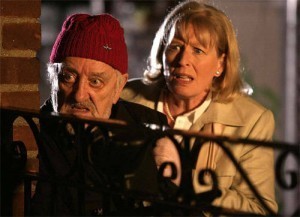 Sylvia has less of a direct relationship with the Doctor as his “mother-in-law” or equivalent for most of Donna’s run, mostly saving up her antagonism for her actual daughter, though she does flap at him a bit by association. While Turn Left shows us Donna’s strength even without the Doctor around (something that makes her loss of memory and character growth even more sad later on), it’s only when the Doctor finally brings Donna home that Sylvia gets to have a proper confrontation with him.
Sylvia has less of a direct relationship with the Doctor as his “mother-in-law” or equivalent for most of Donna’s run, mostly saving up her antagonism for her actual daughter, though she does flap at him a bit by association. While Turn Left shows us Donna’s strength even without the Doctor around (something that makes her loss of memory and character growth even more sad later on), it’s only when the Doctor finally brings Donna home that Sylvia gets to have a proper confrontation with him.
It’s absolutely fair that Sylvia should be not only furious, but fiercely determined to rid him from her daughter’s life once and for all – after all, he has himself told her that Donna will die if she recognises him. While Wilf is gutted at Donna’s loss of her adventures and her history, it’s Sylvia who protects the Donna she knows, the one who isn’t a hero, valuing her daughter’s life over anything else, and oddly it’s something that puts her entirely on the Doctor’s side.
It’s pretty clear that the Tenth Doctor, towards the end of his time, has become so embittered that he avoids any kind of domestic entanglements. He wouldn’t have checked in on Donna at all if Wilf hadn’t drawn him back, and has actively avoided taking on the commitment of a regular companion.
Still, this is still the Doctor who once tried to understand humans and their families, and in providing the lottery ticket for Donna with a pound borrowed (given) by her late father, he reveals that he’s not completely dense when it comes to understanding humanity. Sylvia, proud as she is, would have rejected anything that smacked of charity, but comes undone in the face of him using time travel to allow Donna’s dad to give her a wedding present.
It makes you wonder how often the Doctor is in fact faking it when he pretends to be so very alien.
When the Tenth Doctor regenerated, so did the production team making the show. And all of a sudden, domesticity in Doctor Who was about to look a lot less scary…
Domesticating the Doctor WILL RETURN in Domesticating the Doctor III: Marrying the Ponds
January 3, 2013
Friday Links is Shipping Iced Tea
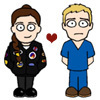 Yes, I said shipping, not sipping.
Yes, I said shipping, not sipping.
It’s a stinker of a hot day, I’m drinking iced tea poured from my shiny new T2 iced tea brewer jug into stylish citrus-coloured glasses, and trying not to spend all the electronic money I don’t have on Doctor Who themed tea. My favourite thing about this site is not just that they know who my beloved Hexy Scofield is (oh, Big Finish companions, why do I love you so?) but they allow you to ship tea blends together and give you discounts for doing so. Hex, for instance, is in a ship with Ace. OH YES HE IS.
 Sure, there are people who design fandom tea based on the actual Doctors too, if that’s your bag (did you know tea fandom was a thing?). But I’m having more fun reading the blends for the companions. (Aww, Turlough isn’t shipped with anyone but OMG his blend is Earl Grey Moonlight, Caramel and Ginger!)
Sure, there are people who design fandom tea based on the actual Doctors too, if that’s your bag (did you know tea fandom was a thing?). But I’m having more fun reading the blends for the companions. (Aww, Turlough isn’t shipped with anyone but OMG his blend is Earl Grey Moonlight, Caramel and Ginger!)
 Speaking of Doctor Who, my favourite written response to the Doctor Who Christmas Special The Snowmen so far is this great Doctor Her article by Nightsky: My bustle’s stuck!: Women vs. Victorian values in “The Snowmen”. Brilliant stuff about Victorian women, Doctor Who, and why talking about clothes is not necessarily frivolous as a woman – sometimes it’s a matter of survival.
Speaking of Doctor Who, my favourite written response to the Doctor Who Christmas Special The Snowmen so far is this great Doctor Her article by Nightsky: My bustle’s stuck!: Women vs. Victorian values in “The Snowmen”. Brilliant stuff about Victorian women, Doctor Who, and why talking about clothes is not necessarily frivolous as a woman – sometimes it’s a matter of survival.
A new Galactic Chat is up! Alisa interviewed Ellen Klages about her work and career.
Twelfth Planet Press announces a collaborative art project with the City of Rockingham: taking a shipment of beautiful but unsellable (due to a printing error) copies of Kaaron Warren’s collection Through Shattered Walls and inviting accomplished paper artists to lead workshops in turning those books into art.
As the person who was in charge of the TPP stall at the convention where the printer error was spotted by the author – the books had shipped directly to the con from the printer and the error (a whole line missing from the top of each right page) was not immediately obvious – and guess who had to break the news to Alisa while she was taking her only lunch break of the whole weekend – cough, anyway. I am VERY GLAD they have found something so innovative and exciting to do with what felt at the time as a disaster of epic proportions. Book art where you don’t have to feel guilty about carving up a book!
Shannon Hale on writing ‘strong female characters’ and what those words even mean.
E-readers have been much on my mind lately (have I mentioned, shiny new Kindle Paperwhite?) and I found this post by Sean the Blogonaut about e-readers and enhanced ebooks thought provoking about what we actually WANT from e-books.
Kate Forsyth writes about her experience reading and blogging reviews for the Australian Women Writers Challenge in 2012.
On the Book Smugglers, Kate Elliott talks about sex in fantasy fiction – and consensual sex in particular.
Sarah Rees Brennan reposts a rant by Yaflash on Tumblr about the aggressive hatred displayed towards successful YA fiction phenomena associated with female writers and readers, with additional commentary of her own.
And heroines, of course: I remember seeing one ‘feminist blogger’ go on for yards about the dreadful ladies, and when I coughed and said ‘the gentlemen, though’ she was like ‘I just can’t talk about those, they make me too mad.’ But the ladies, she could talk about. And all the dreadful lady writers of YA, naturally. But the faults of gentlemen… let us preserve a dignified silence on that topic. Unless it’s ‘he’s awful… SO REALLY, LET’S TALK ABOUT WHAT LIKING HIM SAYS ABOUT HER. DOUBLE AWFUL.’
January 2, 2013
Domesticating the Doctor I: Cocoa, Test-tubes and the Classic Years
I realised while writing my latest “Domesticating the Doctor” essay (still a work in progress) that I never posted the originals to my actual blog. So I’ll be posting them up this week as I work on finishing the new one.
Originally posted at Doctor Her on 5 March 2012.
 Domesticity and Doctor Who don’t seem to fit together, as concepts. There’s something about this show, and its fandom, and possibly the hero himself, that rails against the ordinary and the everyday.
Domesticity and Doctor Who don’t seem to fit together, as concepts. There’s something about this show, and its fandom, and possibly the hero himself, that rails against the ordinary and the everyday.
You could argue (as I think I might, in future posts) that a major theme of New Who is the uncomfortable and at times antagonistic relationship that the Doctor has with domesticity – he rails against it, runs from it, fails to see it when it smacks him in the nose, and on several occasions, has to compete with it for the attention of his companions.
Feminism often struggles to deal with the same issue. There’s a long tradition in feminist history of dismissing or disassociating itself from anything that smacks of the domestic, and while that’s an understandable side effect of trying to increase the options of female (and indeed, male) roles, it’s important to accept that domesticity can be a perfectly valid life choice. Even for superheroes.
Choice is key, though. There’s a big difference between characters who choose to embrace domesticity and those who are pushed into it against their nature. It doesn’t seem likely that the Doctor would ever willingly choose a domestic path… or does it? Before discussing the uses of domesticity in New Who, I want to look at the (far fewer) instances in the Classic series where domesticity is remotely relevant to the Doctor’s aimless, epic lifestyle in the TARDIS.
As it happens, this is the theme of the very first episode, “An Unearthly Child.” The First Doctor has ceased his wanderings in time and space in order to give his granddaughter Susan a “normal” life in one place for a while, and it’s driving him nuts. Susan is enjoying school, but not very good at faking normality, and when her teachers investigate, the Doctor takes the first opportunity he can to cut them all loose from 1963 London and hurl them into the unknown.
We never learn the truth of how and why the Doctor ended up being Susan’s carer, but it’s very clear that the parental role is not one he inhabits comfortably. The addition of Ian and Barbara to the crew, however, gives Susan a semblance of “normal” family life in amongst all their mad adventures, at the expense of Ian and Barbara themselves, who have been ripped from their own life.
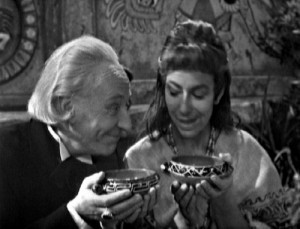 The contrast between mad adventuring and domesticity is actually rife through the First Doctor’s era. For a start, we get to see where they all eat and sleep, something happily ignored for decades at a time in the show. The Doctor accidentally goes through a cocoa-related betrothal ceremony with Cameca in The Aztecs, and responds to this discovery with utter bemusement (but isn’t above using the relationship for his own benefit). He abandons Susan so she can make the most of a fledgling romance in a war-ravaged future Earth (REALLY not a good parent) and promptly takes on a replacement in Vicki, who serves as his surrogate granddaughter up until she also falls in love, and the Doctor cuts her adrift in a war-ravaged Troy. Are we sensing a pattern here? The Doctor is willing to emulate family life on his own terms, travelling around randomly in his intergalactic house, but never considers allowing Susan or Vicki to bring her new boyfriend/future husband into the TARDIS.
The contrast between mad adventuring and domesticity is actually rife through the First Doctor’s era. For a start, we get to see where they all eat and sleep, something happily ignored for decades at a time in the show. The Doctor accidentally goes through a cocoa-related betrothal ceremony with Cameca in The Aztecs, and responds to this discovery with utter bemusement (but isn’t above using the relationship for his own benefit). He abandons Susan so she can make the most of a fledgling romance in a war-ravaged future Earth (REALLY not a good parent) and promptly takes on a replacement in Vicki, who serves as his surrogate granddaughter up until she also falls in love, and the Doctor cuts her adrift in a war-ravaged Troy. Are we sensing a pattern here? The Doctor is willing to emulate family life on his own terms, travelling around randomly in his intergalactic house, but never considers allowing Susan or Vicki to bring her new boyfriend/future husband into the TARDIS.
(Obviously production decisions have a lot to do with this choice, but I didn’t say this article was going to be fair!)
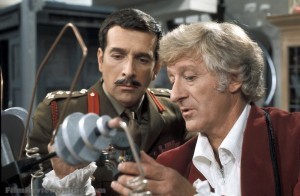 It’s not until the Third Doctor that we see something close to domestication imposed upon him. The Time Lords may have ensured he is stuck on earth in one time stream, but it’s the Brigadier who provides the Doctor with a job and a laboratory, making sure he stays in one place. And boy, doesn’t the Doctor settle in? Luckily there are plenty of alien invasions to keep him amused, but in between all the adventuring and military politics, his life is almost cozy, with female assistants to pass him his test tubes and tell him how brilliant he is. The TARDIS, meanwhile, acts as a glorified cupboard in the corner.
It’s not until the Third Doctor that we see something close to domestication imposed upon him. The Time Lords may have ensured he is stuck on earth in one time stream, but it’s the Brigadier who provides the Doctor with a job and a laboratory, making sure he stays in one place. And boy, doesn’t the Doctor settle in? Luckily there are plenty of alien invasions to keep him amused, but in between all the adventuring and military politics, his life is almost cozy, with female assistants to pass him his test tubes and tell him how brilliant he is. The TARDIS, meanwhile, acts as a glorified cupboard in the corner.
Don’t get me wrong – the Third Doctor is constantly railing against and complaining about being stuck on Earth, and never entirely accepts his confinement. But it’s telling that even when the Time Lords free him from his exile, he doesn’t quit his job – in between travelling in time and space he keeps returning to the laboratory and his UNIT family, drinking Sgt Benton’s excellent cuppas, bickering with the Brig, and tinkering with his cars on the weekend. Likewise, Jo’s time as companion never involves cutting herself of from everyday life – she goes on dates, earns a pay check, goes home to change her boots, and still gets to flit off to alien planets during work hours. Liz never even got to leave Earth!
This Third incarnation of the Doctor, then, is fully house-trained. But as soon as he regenerates into his Fourth identity, he and the TARDIS are off again, without looking back. Whenever the Doctor returns to UNIT you can see that he doesn’t quite fit, and isn’t tempted to stay with them. He is a domestic tourist again, occasionally turning up in the suburbs or someone’s home, but only when there’s something nasty in the woodwork.
The Fifth Doctor Years transform the TARDIS into something more home-like as in the early 60′s, with his companions’ bedrooms as regular sets – but eventually they all leave him to go home, or to find a new one. The Seventh Doctor examines domesticity through something of a scientific lens as he sorts out Ace’s back story, but family and home life in that era of Classic Who are portrayed very much as sources of gothic and suburban horror rather than somewhere safe and warm.
In the New Adventures novels, there’s only one really clear instance I recall where the Doctor was completely immersed in domesticity – the novel Human Nature by Paul Cornell, which I’ll talk about when I get to the David Tennant years rather than deal with the same plot twice. It’s one I highly recommend, though, if only to compare to the TV version!
In the Big Finish audio adventures, which occupy a headcanonspace for me between the classic and new series, even though there is substantial overlap with New Who, there’s only one relationship that I felt really pulled the Doctor against his nature into something like a domestic sphere. This was the pairing of the Sixth Doctor and Dr Evelyn Smythe, who is also the first ‘old lady’ companion the Doctor has ever had, though she was only 55 (a spring chicken!) when she first ran away with him.
Evelyn is a fabulous character, and managed to soften the blunter edges of the Sixth Doctor, not complaining about his pompousness as Peri did, but actively training him out of such behaviour. In “Thicker Than Water,” when he takes Mel to meet Evelyn, it’s clear that he credits Evelyn with having substantially improved his manners and temperament in dealing with people.
That word ‘cozy’ comes up again – while there is no romantic spark at all between the Doctor and Evelyn, they settle easily into the dynamic of an old married couple, and their adventures are dotted with nice chats, cups of cocoa (of the non-marital variety), and gentle holidays in between the madness and the Daleks. Evelyn leaves for love, but that’s not the end of her adventures, nor the end of her relationship with the Doctor, who COMES BACK TO SEE HOW SHE’S DOING ON PURPOSE, something which I don’t think has happened in his history before. This relationship was very much a hint towards how the 21st Century Doctor (both in audio and on TV) was going to develop differently.
For the most part, the Doctors of the classic series and their associated (pre-2005) spin offs not only avoid domesticity, and long term family or relationship ties, but seem to look straightthrough them, ignoring their existence. No, not even ignoring their existence, because he’s so rarely put in a situation where they impinge upon his reality.
The endless traveller is constantly moving forward. He never stops to pick out furniture, or to drop in to any former companions’ homes for tea, biscuits and baby photos. Even his beloved TARDIS is constantly changing (or being changed) by him, often at times of emotional crisis – the jettisoning of Romana’s room, for example, or the restoration that happens just before The Five Doctors.
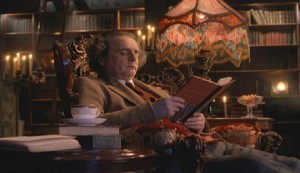 But something does change for him, and it’s possible that the turning point can be seen in the portrayal of the elderly Seventh Doctor at the beginning of the TV Movie, which also marks close to the halfway point of the Wilderness Years between Classic and New Who – instead of the stark white console room, we see flying buttresses and a sitting room that resembles a Victorian parlour – the Doctor sips his cup of tea and reads a book, surrounded by the music from his record player, a dish of jelly babies and a cluttered (one might almost say, cozy) assortment of possessions.
But something does change for him, and it’s possible that the turning point can be seen in the portrayal of the elderly Seventh Doctor at the beginning of the TV Movie, which also marks close to the halfway point of the Wilderness Years between Classic and New Who – instead of the stark white console room, we see flying buttresses and a sitting room that resembles a Victorian parlour – the Doctor sips his cup of tea and reads a book, surrounded by the music from his record player, a dish of jelly babies and a cluttered (one might almost say, cozy) assortment of possessions.
It’s a calm, utterly domestic scene between a Time Lord and his TARDIS. Who else, after all, was he ever going to settle down with?
The Eighth Doctor we see in the TV Movie was every bit the undomesticated adventurer of most of his predecessors, but for the first time in that story we see a companion’s home, and a friend for the Doctor who is willing to not only turn down his invitation to travel in the TARDIS, but to counter it with an invitation of her own: to stay with her, and fit into her life.
Of course he didn’t say yes – barely even took the question seriously. But the fact that it had been asked was a turning point for the series. Not since Cameca in The Aztecs and Susan before An Unearthly Child had someone suggested to the Doctor that he stop moving for personal reasons, and choose to settle down in one time and place.
When Doctor Who came back in 2005, that question was going to get larger, and louder, and domesticity would no longer be something the Doctor would have the luxury to ignore, as the show itself began to pay greater attention to the needs of the humans around him.
But this post is long enough already. Tune in soon for Part II of Domesticating the Doctor!
Elsewhere on the Internet: Mind Meld, TPP & Verity!
Over at the MindMeld, I answer the question of ‘what books do people expect you to like but don’t?’ If nothing else, head over to hear my spirited rant about the sinister work of Beatrix Potter.
The Twelfth Planet Press website has been updated for the new shiny year! Head over, admire its shinyness, and while you’re there you might want to consider pre-ordering the upcoming 2013 titles from Livia Day, Andrew Macrae, and the next in the Twelve Planets series: Asymmetry by Thoraiya Dyer.
All this, and the first “real” episode of Verity! was published today! We review The Snowmen, talk about Clara’s frocks, the new credits sequence, Vastra and Jenny’s marriage, the return of Strax, kissing in Doctor Who, plus Liz gets to bounce about the Great Intelligence. We start as we mean to go on!
Check out Deborah Stanish’s post on how she got the band together. You can subscribe to us at iTunes (Doctor Who: Verity Podcast), like us at VerityPodcast on Facebook, follow us on Twitter as @VerityPodcast or even all three!
How Does She Do It?
I love this picture. It basically sums up everything I’ve ever written about writing/mothering.
I came across an old post of mine, Writing While the House is Messy, and it sparked off a whole lot of recent thoughts I’ve been having about writing and parenting (specifically mothering which carries an emotional baggage and social expectation with it that is particularly weighty).It’s school holidays, a shorter summer than we’re used to now that Tasmania is finally going to the four terms system. And what I should be doing is what I have done most other holidays, which is relax, read books, enjoy my kids without wanting to strangle them, and not put pressure on myself to MAKE WITH THE WORDS, MADAM.
But no, this summer I am writing. Not one thing, not a big pressing deadline (that’s for next month!) but I decided that I needed to put something on paper this January, to start as I mean to go on for this year. It’s now the 2nd of January, the first day that my honey is back at work leaving me with the two girls, and it’s already been a balancing act.
I always forget about the cleaning. There’s so much more of it in the holidays, because they’re here ALL THE TIME, and plates get dirtier, and clothes tear through the mud, and oh the toys, the toys get everywhere. Shoes are always underfoot, partly because Jem likes to stand in whichever shoes are closest (the more outlandishly big on her tiny feet the better) and tromp them from room to room until she can leave them in the perfect place to be tripped over later.
The detritus of Christmas is still partly with us – not just the tree and many of the more recently unwrapped gifts, but scraps of paper and plastic, stray ribbons and gift bags. Half open packets, and empty stockings. Sure, I could have tidied it all up by now. But frankly, I’ve BEEN tidying it up since December 25th, and it doesn’t seem to be getting any neater.
I swear, the walls pump out glitter and stray hair elastics across the carpet whenever I step into another room.
So am I crazy to want to write amid this madness, with the children wanting playdates and science experiments and painting activities and APPARENTLY LEARNING TO RIDE A BIKE, IT’S A THING. Well, no. Because if I wasn’t trying to write around it all, what would I have left? The children would still be giggling madly or trying to strangle each other (usually both), I’d still be picking Lego bits and stray Monopoly houses from between my toes every now and then, and chances are I wouldn’t be any happier than I am now, because I’d have all the detritus AND no wordcount down on the page.
Also, if I spent every waking hour trailing my children to tidy the crumbs and feminist action heroes and picture books they scatter from room to room, I’d probably end up yelling at them a whole lot more than I do.
Writing makes me a better mother. At least, I think it does.
So um, today I decided to write a book. Not any of the other many books I am working. A New Thing. A book about the balance of mothering and writing, and particularly the experience of trying to build a professional writing career while looking after young children. While a lot of it is going to come from me, obviously, and the anecdata I’ve been gathering from friends and colleagues for years due to being fascinated with the topic, I’d really like to be able to refer to the specific experiences of as many different writer-parents as possible. So I made a little survey meme!
If you identify as a writer and a parent, and especially if your parenting is of the “I’m the one at home on the front line” variety (though balancing outside work AND parenting AND writing is a mammoth, majorly impressive task, I am very grateful I have so little experience at doing all three at once) I would love it if you could answer some or all the following questions – in a comment to this post, in a blog elsewhere, in a private email (tansyrr at gmail dot com) or by any other means. Letter? Carrier pigeon?
How Do You Get It Done? The Writer Parent Survey.
How does your role as a parent get in the way of your writing?
How does your role as a writer get in the way of your parenting?
How has either of those issues changed as your kids grew up?
When is it hardest to write?
Do you have a separate space in (or outside) your house for writing? Why?
Does your family value or understand your writing?
What most frustrates you about finding the balance?
Are you a better writer because of your parenting? Why?
Are you a better parent because of your writing? Why?
[Please indicate whether it’s OK for me to quote your answers, and if you would prefer to be named or remain anonymous, either in my future blog posts on the topic or The Book]
I’d really appreciate it if you passed this on to anyone who you think would be interested in answering the questions, and that if you answer indirectly (like on you own blog) that you send me a link so I can read your answers!
January 1, 2013
Short Story: Please Look After This Angel
 This story was performed at MONA as part of the Angel Story event in July 2012, and subsequently published on Islandia, the Island Magazine blog. Because it’s not the kind of blog where you can link to individual entries, I thought I’d repost the story here for future reference.
This story was performed at MONA as part of the Angel Story event in July 2012, and subsequently published on Islandia, the Island Magazine blog. Because it’s not the kind of blog where you can link to individual entries, I thought I’d repost the story here for future reference.
I could have offered it up as a Christmas present to my blog readers, but the thought of giving an angel story AT CHRISTMAS was too much twee for me to cope with, plus it’s not that kind of angel story. Also I didn’t want to inflict melancholy on people during the festive season. The 2nd of January, though, is the perfect date for melancholy!
PLEASE LOOK AFTER THIS ANGEL
By Tansy Rayner Roberts
first published in Islandia, 2012.
1.
The Sydney job only lasted a few months, and she was miserable for most of them. Kerry remembers sitting on the train, surrounded by mechanical clatters and whirrings. Dull back fences and walls trailed past her window until one leapt out at her, bright and fierce with its graffiti tags and artwork.
One phrase, spray-painted into her retinas.
PLEASE LOOK AFTER THIS ANGEL.
2.
James and Kerry have been ‘going out’ for three years now, and they seem to have left it too late to move in together. She’s losing him, she can feel it. Whenever she tries to have a conversation about the future, about where they are going (if they are going anywhere) he circles around to the one thing in his life that he is completely certain about.
It’s the angel.
He saw it once, when he was eighteen, on his first pub crawl. He remembers the pub perfectly – the sign outside, the sticky floors, the stupid joke toilet signs. He remembers the small, quiet figure in the corner, its wings tucked around itself as it nursed a lemon, lime and bitters.
It was an angel, he insists. It had a halo and everything, hovering several inches off its hair. No, it wasn’t someone in fancy dress. No, it wasn’t a religious experience. It was, simply, an angel. It looked sad, and he wanted to say something clever, to cheer it up. But he couldn’t think of anything until later.
James has never been able to find that pub again. But sometimes on the weekends, or after work, he goes walking, and Kerry knows he is trying to find it, trying to prove to himself that he really saw what he thinks he did.
Every time he sets out to find it, and fails, she loses another piece of him.
Perhaps there was nothing there to begin with.
3.
The second hand bookshop job is temporary, or that’s what Kerry tells herself. It’s not exactly using her degree, is it?
She’s happy there. She likes to shelve books, and to sort through the boxes that get donated to them. A lot more donations than there used to be – everyone’s ditching their libraries in favour of a Kindle. She likes the smell of the place, and the customers.
It was the last place she expected to see an angel. But there he is in the foreign literature section, perusing French and Belgian novels. It’s a shock to her – she can’t stop staring at him.
Him, she thinks. Almost certainly him. He wears an old fashioned brown suit, very grandfatherly, though his face seems quite young and his hair is blond, not greying at all. He has a very lived-in look about him, and she might have thought him nothing but the usual sort of customer, if not for the halo.
James was right. When you see it, you know it’s not a trick, or a costume. There’s no denying the glow about his hair, and the light that floats out above his head. It makes her feel warm down to her feet. Is this a religious experience, or the early stages of psychosis? It’s not like she’s been looking for angels all this time. She hardly even thinks about James any more – the breakup was years ago, and awkward rather than messy.
As the angel chooses a novel and comes to pay for it, she gazes upon his face, and perhaps it’s not a him after all. There’s something utterly female about the beauty of his face beneath unkempt eyebrows.
She says nothing during the transaction, but smiles hesitantly and receives such a beam in reply that it almost knocks her off her feet. The moment he/she is gone, Kerry can’t remember what book it was, and has to check her copy of the handwritten receipt to see that, yes, it was Les Liaisons Dangereuses.
She is certain there were no wings beneath the suit jacket, and yet later when she sweeps the wooden floor before closing, she finds tiny golden feathers all over the floor.
4.
When she was a little girl, Kerry loved the clock in the Cat and Fiddle Arcade. When shopping with her mother, she would always pester her about the time, whether it was close to the hour, and if they could go and watch the mechanical delight: the nursery rhyme, the cat and the cow and the dog and the dish and the spoon.
Even now as an adult, whenever she is walking through the centre of Hobart, she checks her watch to see if she can make it in time. There are so many doughnut bars and muffin counters in the place now. It is always jammed with people, and no one else ever seems to be waiting for the moment as she is, breath caught in her lungs, waiting to see if the music will whir into life, and the clock will begin to dance.
It never lets her down. But it’s always a shorter performance than she remembers from her childhood.
Once, when she was eight, she was sitting there with her mother when the mechanical music hummed and began, and she was gazing so intently at the clock that she did not realise until it was halfway through that everyone had stopped.
Everyone in the arcade was frozen, for the minute or two that it took for the song to play out. And though it was strange to see her mother still like that, caught between the sip of her coffee and the swallow, Kerry didn’t look for long in case she missed the bit with the dog, which was her favourite.
Once the song shuddered to a stop, the arcade sprang into life again, her mother swallowed her coffee, and it was as if the whole thing had never happened.
It was the best memory in her life to date, and had nothing to do with angels.
5.
Kerry spots the angel everywhere. He stares out at her from regional newspaper articles about library fundraisers and junior soccer. She catches glimpses of him in mirrors, and other reflective surfaces including puddles, fridges and her mother’s silver teapot.
He never looks as happy as he did that day in the bookshop.
She sees him on stage in Agatha Christie’s The Mousetrap, playing a Major. His wings peep out from beneath a tweed jacket, and no one else seems to notice them.
When Sara announces they will be taking a wine tour by bus for her hen weekend, Kerry thinks this is the perfect excuse to get away. But two vineyards and several glasses of sparkling white later, she spots the angel picking grapes in faded overalls, a straw hat over his bright, bright halo.
Madness seems the likeliest explanation.
He’s at the wedding. He sits among the friends of the groom, chatting amiably with several young men who seem to know him. He wears an unfashionably long coat to disguise his wings in the church, but does nothing about the halo. It is brighter than ever, a scribble of yellow light blazing around his beautiful, perfect face.
Kerry chose the wrong dress. It’s too short, too tight, and she feels like an idiot. She can’t stop staring at the angel.
The reception is in a stuffy pavilion, full of champagne and shrieking and taffeta and very tiny sausage rolls. Kerry drinks rather too much. She finds herself standing outside in the freezing air, far from the pavilion, with a small group of exiled smokers and a bottle of cointreau liberated from the bar. She hasn’t smoked in years, and it feels like her own skin is cracking and peeling away with every inhalation.
Everyone drifts back to the reception, one after the other, and finally there are just the two of them left, Kerry and the angel, standing in a cold field with a tin of cigarette butts between them.
“Do I know you?’ he asks politely.
“You bought books from me once,” she says. “And I know what you are.”
He gives her a tolerant smile. Perhaps this happens to him a lot. Like being recognised for some old band you were in once.
She sticks her hands in her pockets, to warm them up and prevent herself from lighting another smoke. Already she feels like she might be sick from it, or from the Cointreau, or both. It hasn’t been a happy night. “Do you grant wishes?” she blurts out.
The angel’s smile fades, as if he’s disappointed in the question. Of all the enormous, life-defining things she could have asked him, she went with the greed right up front. But she’s never been religious in any direction, doesn’t know much about the traditions, except that a lavender-scented great aunt always kept a gold angel pin near her collar, and said it was for good luck.
“What would you wish for?” he asks.
Kerry hasn’t thought that far ahead, and feels like an idiot. “World peace?”
The angel throws back his head and laughs, a heavy guffaw like a sound from another age, and she finds herself laughing too, crazy laughing, like she hasn’t in years. She likes the curve of his jaw as he laughs. He doesn’t look so pretty that way. More human.
“An ex of mine saw you in a pub once, in Sandy Bay,” she confesses. “He drove me nuts trying to find it again, to prove you existed. The loo doors had a crab and a lobster on them.”
The angel nodded, remembering. “It’s in Battery Point, not Sandy Bay.”
“Oh,” she said. “That explains why he never found it.”
It’s awkward after that, and she feels she’s said enough that she can let it go now, go on with her life. “Take care,” she says, which she never says to people, it’s something her great-aunt always said, at the end of every phone conversation. Take care, take care of yourself, drive carefully. As if ‘careful’ made some sort of positive difference in the world.
“You take care too,” he says, and the sincerity radiates out of him, almost as bright as the halo above his unkempt hair.
She walks away on unsteady heels.
6.
Kerry has drunk too much to drive home, and so has everyone else. You can’t get taxis all the way out here. She turns down a couple of offers of lifts before deciding on Dave, who’s a good sort and has mostly been sticking to the orange juice.
Only they don’t drive home. They end up having sex in the back of his car down by the river, and it’s uncomfortable and kind of weird but it’s been that kind of evening anyway. Afterwards they drive back slowly towards Hobart, not even bothering to make awkward conversation.
There’s a friend’s car in the ditch, only a few kms from the wedding reception, and Kerry recognises the dresses and shoes being loaded on to ambulances. Dave parks and the two of them lean against his car to watch the whole messy business, even now having nothing to say to each other.
Take care, take care of yourself, drive carefully.
One of the crumpled figures in the car didn’t make it. Dave tries to take her hand, and Kerry won’t let him.
The angel is sitting on the bank, a short distance from the accident, smoking another cigarette and staring into the distance. Kerry walks over to him, her heels sinking into the soft earth, and sits on the damp grass, not caring what it does to her dress.
“No,” says the angel, after a little while. “I can’t grant wishes.”
He needs a haircut. It’s too long and uneven by his ears. His halo is so dim now that Kerry can hardly see it in the dull 5am light of the morning.
“Do you want to get a cup of coffee some time?” she asks.
The angel sniffs, and stubs his cigarette out on the grass. “Okay.”
She takes his hand, and they wait for the day to get better.
[END]
December 31, 2012
Scary Astronauts are Go! [WHO-50—1970]
Season 7 of Doctor Who is a fan favourite, probably because of its taking itself terribly seriously (unlike the more fun later seasons of the Pertwee era). This season does have some great elements to it, especially the snarky and intelligent companion Dr Liz Shaw, the early and rather more prickly version of the Brigadier, and Jon Pertwee playing the Doctor far more straight than at any other time in his run.
It’s also a season which has provided a great deal of inspiration to the 2005- version of the show, featuring the debut appearance of both the Autons and the Silurians, and a rare example of a parallel universe (a narrative ploy also used for great effect in New Who).
What I hadn’t quite twigged until the DVD release of The Ambassadors of Death, the third of four stories featuring the Third Doctor with his UNIT-and-Liz-Shaw ensemble, is that this season also used the masked figure of astronauts as creepy figures of horror, something which has been something of a feature of several Steven Moffat-written stories, and the River Song arc in particular.
(Hey, who turned out the lights?)
There are several certainties in Third Doctor Earth-based stories:
1) anything that comes or falls from the sky is Bad and must be Stopped.
2) ministry officials are all stuffed shirts who must be mocked by the Third Doctor and his eyebrows.
3) computers are untrustworthy and possibly evil (for all his pro-science talk, the Doctor is a bit of a luddite)
4) it doesn’t matter how straight Pertwee is playing the Doctor, he will still take any opportunity he can to put on a silly voice.
 The Ambassadors of Death covers all of these! The first episode is mostly talky political stuff, revolving around mission control trying to recover a space crew – the highlight is a cute sequence in which the Doctor uses his console (extracted from the TARDIS and placed confusingly in a parlour somewhere in UNIT headquarters) to slip the two of them back and forth in time, making the most of the brand new CSO technology. Once the capsule itself lands, however, we are flung into a mighty action sequence (ACTION BY HAVOC) which deeply impressed me. I have never been particularly seduced by the action aspect of the Pertwee era (though I maintain that the chase sequence in Planet of the Spiders is one of the finest scenes in Doctor Who full stop), but this one floored me.
The Ambassadors of Death covers all of these! The first episode is mostly talky political stuff, revolving around mission control trying to recover a space crew – the highlight is a cute sequence in which the Doctor uses his console (extracted from the TARDIS and placed confusingly in a parlour somewhere in UNIT headquarters) to slip the two of them back and forth in time, making the most of the brand new CSO technology. Once the capsule itself lands, however, we are flung into a mighty action sequence (ACTION BY HAVOC) which deeply impressed me. I have never been particularly seduced by the action aspect of the Pertwee era (though I maintain that the chase sequence in Planet of the Spiders is one of the finest scenes in Doctor Who full stop), but this one floored me.
Not only did they build a proper sized recovery capsule, they also loaded it on to the back of a truck with a crane, brought in a helicopter (a real one!) and staged an air raid on the truck using explosives. I just kept saying ‘but… so expensive!’
This episode also features a completely adorable sequence in which, after the recovery capsule has been hijacked, the Doctor hijacks it right back, by acting like an old duffer (funny voice alert!) and magnetising a bunch of bad guys to his car. Yes, really.
So when the Brigadier turns up to report the theft of the capsule, there’s the Doctor, smug all over his face, showing that he got there ahead of them. It’s the first truly cozy moment of the growing friendship between the Doctor and the Brig, that grudging smile on Nicholas Courtney’s face.
“So cute,” I cooed.
“What is?” asked Raeli.
I explained my soppy reaction, and her face cleared. “Oh, but the Brigadier would be much cuter if he was drawn like Tiny Titans,” she decided.
“I suppose so…”
Throughout the entire third episode, she drew with deep concentration, occasionally asking me to pause the TV, or to look up a picture of the Brigadier’s uniform online when the DVD case proved lacking in detail. And she produced this:
My daughter the fan artist. She’s not eight yet! I’m so proud of the character and style she managed to put into this sketch. It was all I could do not to ask her to do a set of the classic companions, from Barbara to Ace!
But what about the second half of the story?
I was pleased with Liz Shaw’s role throughout – there were several episodes in which she hardly appeared or didn’t have much to do, but her role grew stronger as the story continued, largely because she was separated from the Doctor and had her own narrative. I particularly liked her pragmatism in working ‘for’ the enemy, a moral choice later endorsed by the Doctor, who does exactly the same thing.
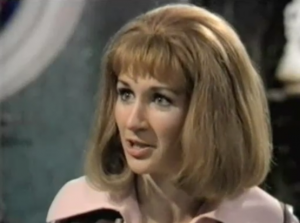 She also got some adventuring in, including the famous ‘dangles off a weir while pregnant’ sequence, and combat driving of Bessie. Is Liz Shaw the only woman who drives Bessie before Ace (and possibly Doris) does in Battlefield? I’m pretty sure neither Jo nor Sarah were handed the keys at any point in the 70’s.
She also got some adventuring in, including the famous ‘dangles off a weir while pregnant’ sequence, and combat driving of Bessie. Is Liz Shaw the only woman who drives Bessie before Ace (and possibly Doris) does in Battlefield? I’m pretty sure neither Jo nor Sarah were handed the keys at any point in the 70’s.
Speaking of Liz, I consider it a tragedy of epic proportions that I was unable to find a decent image of her white boots on the internet. Internet, what is the point of you if you cannot do this??
The space sequences were very well done, and I love the fact that the Third Doctor manages quite casually to get himself into an astronaut suit – his persona throughout the whole story is so serious and authoritarian (except when he’s mocking establishment figures, which is usually him at his most naughty and rebellious) that he gets the job done through sheer force of will, and I love that he’s willing to rocket himself into space using 1970’s technology purely to prove an argument to the powers that be.
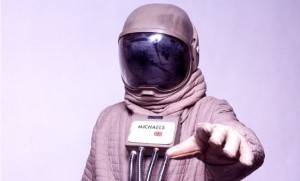 But oh, those astronaut suits. Such a simple idea, to use the masked figures as something scary and mysterious rather than heroic – and to do it in a story that would screen only a year after Neil Armstrong’s famous first step on the Moon. It’s very well done here, and the reveal as to what is under the visor’s can’t help but be disappointing after all the build up… something that can’t be said for Steven Moffat’s take on the same ‘astronauts are scary’ concept in Silence in the Library & The Forest of the Dead (and again several years later in The Impossible Astronaut and Day of the Moon).
But oh, those astronaut suits. Such a simple idea, to use the masked figures as something scary and mysterious rather than heroic – and to do it in a story that would screen only a year after Neil Armstrong’s famous first step on the Moon. It’s very well done here, and the reveal as to what is under the visor’s can’t help but be disappointing after all the build up… something that can’t be said for Steven Moffat’s take on the same ‘astronauts are scary’ concept in Silence in the Library & The Forest of the Dead (and again several years later in The Impossible Astronaut and Day of the Moon).
Still, The Ambassadors of Death is a good old space-and-espionage story and showcases exactly what Jon Pertwee, Barry Letts and the team were trying to do with this new Third Doctor Era – dignity, drama, action and space stuff. Most excellent!
ELSEWHERE ON 1970:
The Third Doctor [Tor.com]
How Caroline John Helped Save Doctor Who [io9]
Dr Liz Shaw [MarlowInc]
A Modern Women’s Guide to Classic Who – The Third Doctor [tansyrr.com]
Spearhead from Space [Wife in Space]
Nicholas Courtney & Caroline John discuss his bum in the Spearhead from Space commentary [whatthefoucault]
The Silurians [Hoo on Who]
Ambassadors of Death [DVDactive]
Neela Debnath reviews Inferno [Independent]
Inferno [Wife in Space]
3rd Doctor [Springfield Punx]
December 30, 2012
Looking Towards 2013
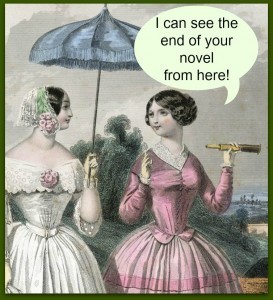 I’m still getting the hang of what I want my writing/professional goals to be this coming year. I’m pretty sure I need some because 2012 was such a scattered year for me, but I want to keep that flexibility that I had to respond to new projects, and I also don’t want to heap too much pressure on myself instead of enjoying the last year with Jem properly at home – she starts kindergarten three days a week in 2014 and while that isn’t going to make a massive difference to now when she has 2 full daycare days a week, it means a lot psychologically. She will be a SCHOOL GIRL.
I’m still getting the hang of what I want my writing/professional goals to be this coming year. I’m pretty sure I need some because 2012 was such a scattered year for me, but I want to keep that flexibility that I had to respond to new projects, and I also don’t want to heap too much pressure on myself instead of enjoying the last year with Jem properly at home – she starts kindergarten three days a week in 2014 and while that isn’t going to make a massive difference to now when she has 2 full daycare days a week, it means a lot psychologically. She will be a SCHOOL GIRL.
So, what does 2013 hold?
At least one novel deadline, which is good. I need to get the revised manuscript of Drowned Vanilla, the second Livia Day novel, to Twelfth Planet Press by May. Have I mentioned how much I adore having deadlines?
I also have one for a solicited short story, which always makes me happy. But apart from that…
Well, speaking of Livia Day, A Trifle Dead will be released in March, and we are planning a launch in Hobart for the 28th. I’ve also sold two stories (as TansyRR) to the Fablecroft anthology One Small Step, and the Lethe Press anthology Where Thy Dark Eye Glances: Queering Edgar Allan Poe.
Travel-wise I have been saying ‘no’ to everything, conventions and the like (yes EVEN CONFLUX) because we are saving every penny towards the Big One in October – WFC Brighton. I haven’t quite given up on the idea of Melbourne in June, though, because So Many Incentives.
As for writing, well. I have The Novel and The Other Novel, but mostly what’s exciting me right now is the idea of writing shorter series of stories and novellas for digital markets. The publishing game is changing in so many ways and I’ve got a year of negotiating with the attention span of a three year old ahead of me, so… it makes a lot of sense.
I still love big fat fantasy novels, but the shorter stuff is luring me in, and given that I have another year or two of negotiating work time around the attention span of a 3-4 year old, it seems the best direction for me.
There will be lots of blogging, of course, with particular focus on my Doctor Who 50th Anniversary series, though I also want to finish the Pratchett’s Women essays and get a LOT more Where The Wonder Women Are posts written. In podcasting we will be back at the end of January with Galactic Suburbia, ready for another year of SFnal snark and publishing natter, and while I’m twiddling my thumbs waiting for my two podcasting partners to return from their summer adventures, I have Verity to keep me busy. Doctor Who podcasts for the win!
The Doctor Who podcasting community means a lot to me, as it was they who inspired me to push for Galactic Suburbia to be a thing, PLUS they are the only reason the washing up in our house ever gets done (by me) so it’s super bouncy exciting to be doing a project that makes me part of that gang, even if it’s going to be a remote membership and I sadly doubt I’ll be making it to a Gallifrey convention any time soon. (though I willlll be in Britain later this year…)
Being commissioned for the Chicks Unravel Time piece was really important to me too, and I want to work harder on trying to get paying gigs with non fiction writing. Can’t be too hard, right?
A busy year ahead of me, and so much family stuff to look forward to in between all the laptop-related activities, but most of all I want this to be a year in which THINGS GET FINISHED. Grant applications, novellas, co-written novel projects (you know who you are), blog series, quilts, articles, hell even the washing up.
Things will be finished. Names will be taken. 2013 is the year of getting shit done.
See you there, sweeties!

